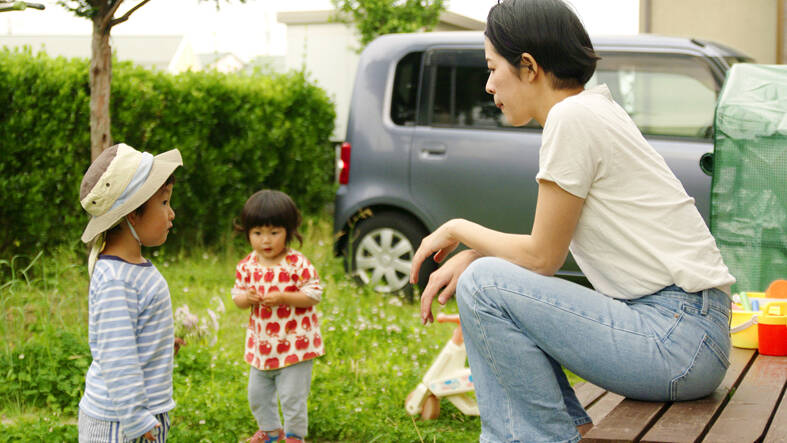The women work hard, sleeping only a few hours a night, as they juggle the demands of caring for their children and doing housework — all while suffering from poverty.
The award-winning independent documentary film The Ones Left Behind, released last year, tells the story of such single mothers in Japan, weaving together interviews with the women and experts, and showing the other side of a culture whose ideal is for women to get married and become stay-at-home housewives and mothers.
“This is a topic that no one wants to really touch. In Japan, it’s very taboo,” Australian filmmaker Rionne McAvoy said Tuesday. “I think it’s a very apt title because I feel that single mothers and their children have really been left behind in society.”

Photo: AP
One woman in the film says she works from 8:30am until 7:30pm, while earning less than 200,000 yen (US$1,350) a month.
Tomiko Nakayama, another woman in the film, says: “I have to do everything on my own.”
Despite being one of the world’s richest nations, Japan has one of the highest rates of child poverty among OECD countries, with one in every seven children living in poverty. About half of single-parent households live below the poverty line.
Japanese society also tends to favor full-time male workers, and women often receive lower wages and fewer benefits, even when they are working full-time and overtime.
Another woman in the film is near tears as she describes how her child stopped asking her about take-your-parent-to-school days. She knew her mom was too busy and couldn’t attend.
McAvoy’s wife, Ayuri, who produced the film, was formerly a single mother. But both deny that’s why Rionne McAvoy made the film. Initially, she wasn’t interested in getting involved in his filmmaking.
What makes the story so “Japanese,” according to Rionne McAvoy, is how the country’s conformist culture makes many women accept their hardships, too ashamed to ask for help, “keeping their public face and private face separate,” he said.
The Ones Left Behind was the Best Documentary Winner at the Miyakojima Charity International Film Festival last year and an official selection at the Yokohama International Film Festival.
Despite repeated promises by the Japanese government to provide monetary assistance to people with children, action has been slow, said Akihiko Kato, a professor at Meiji University who appears in the film.
That’s partly why the birth rate is crashing in Japan from 1.2 million births in the year 2000 to below 700,000 today. Japan also lacks a system that can force fathers to pay child support, according to Kato.
In the past, grandparents, neighbors and other members of the extended family helped look after children. In the modern age of the nuclear family, the single-parent household is often on its own.
What this means for the children is sobering, said Yanfei Zhou, a social science professor at Japan Women’s University who appears in the film. The gap between the haves and have-nots is growing, and the children are destined to inherit the cycle of poverty, she said.
The story of the underclass, including those who are forgotten and don’t have a voice, has long fascinated McAvoy. His next film will be about young people driven to suicide in Japan. He said that being an outsider allows him to tell stories with a fresh perspective and without bias.
“It’s one thing we can do more of in society: to try recognize people’s cries for help,” McAvoy said.

June 9 to June 15 A photo of two men riding trendy high-wheel Penny-Farthing bicycles past a Qing Dynasty gate aptly captures the essence of Taipei in 1897 — a newly colonized city on the cusp of great change. The Japanese began making significant modifications to the cityscape in 1899, tearing down Qing-era structures, widening boulevards and installing Western-style infrastructure and buildings. The photographer, Minosuke Imamura, only spent a year in Taiwan as a cartographer for the governor-general’s office, but he left behind a treasure trove of 130 images showing life at the onset of Japanese rule, spanning July 1897 to

In an interview posted online by United Daily News (UDN) on May 26, current Chinese Nationalist Party (KMT) Chairman Eric Chu (朱立倫) was asked about Taichung Mayor Lu Shiow-yen (盧秀燕) replacing him as party chair. Though not yet officially running, by the customs of Taiwan politics, Lu has been signalling she is both running for party chair and to be the party’s 2028 presidential candidate. She told an international media outlet that she was considering a run. She also gave a speech in Keelung on national priorities and foreign affairs. For details, see the May 23 edition of this column,

The Taiwan People’s Party (TPP) on May 18 held a rally in Taichung to mark the anniversary of President William Lai’s (賴清德) inauguration on May 20. The title of the rally could be loosely translated to “May 18 recall fraudulent goods” (518退貨ㄌㄨㄚˋ!). Unlike in English, where the terms are the same, “recall” (退貨) in this context refers to product recalls due to damaged, defective or fraudulent merchandise, not the political recalls (罷免) currently dominating the headlines. I attended the rally to determine if the impression was correct that the TPP under party Chairman Huang Kuo-Chang (黃國昌) had little of a

At Computex 2025, Nvidia CEO Jensen Huang (黃仁勳) urged the government to subsidize AI. “All schools in Taiwan must integrate AI into their curricula,” he declared. A few months earlier, he said, “If I were a student today, I’d immediately start using tools like ChatGPT, Gemini Pro and Grok to learn, write and accelerate my thinking.” Huang sees the AI-bullet train leaving the station. And as one of its drivers, he’s worried about youth not getting on board — bad for their careers, and bad for his workforce. As a semiconductor supply-chain powerhouse and AI hub wannabe, Taiwan is seeing